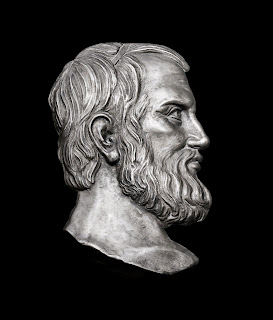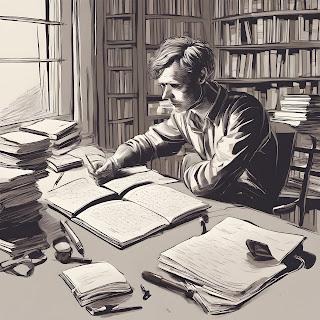Discover the art of script writing, get book writing and promotion tips, and get recommendations for captivating books on Pen and Plot. Join our community of passionate writers and readers today!
Wednesday 28 February 2024
Sophocles: Analysing the Themes and Characters in Antigone
Sunday 25 February 2024
The Mythical King of Athens: Unveiling the Legacy of Theseus in Greek Theatre and History
In Greek mythology, Theseus was a legendary hero and the mythical king of Athens. He is known for his bravery, intelligence, and remarkable feats; He was considered the biggest hero only after Heracles, which have left a lasting impact on Greek history, art, and culture. Theseus is celebrated as a symbol of heroism and as an embodiment of the ideals and values of ancient Athens.
The Legend of Theseus in Greek Mythology
The legend of Theseus is one of the best-known stories in Greek mythology. According to the myth, Theseus was the son of Aegeus, the king of Athens. His journey began when he set out to Athens from his birthplace, Troezen, to claim his rightful place as the heir to the throne. On his way, he encountered numerous challenges, including the famous battle with the minotaur in the labyrinth in Crete. Theseus successfully defeated the Minotaur and returned to Athens as a hero.
The Appearance of Theseus in Oedipus at Colonus
One significant appearance of Theseus in Greek theatre is in the play ''Oedipus at Colonus'' by Sophocles. In this play, Theseus plays a crucial role in helping Oedipus, the tragic hero, find redemption and peace. Theseus is depicted as a wise and compassionate king who offers Oedipus shelter and protection. Through his interactions with Oedipus, Theseus embodies the qualities of empathy and benevolence, highlighting the importance of compassion and forgiveness in Greek society.
The Marathon: A Historic Connection to Theseus
According to the ancient writer Plutarch, there is a fascinating account of the ghost of Theseus appearing to come out of the ground, inspiring the Athenians, and leading them against the Persians. This legendary event is steeped in the rich mythology and history of ancient Greece, reflecting the enduring legacy of Theseus as a hero and leader.
The Legacy of Theseus in Art
Beyond the Greek theatre and mythology, the legacy of Theseus extends into various realms of history and art. His story has been depicted in sculptures, pottery, and paintings throughout the centuries. Theseus became an iconic figure in Greek art, representing the ideals of heroism and virtue.
Wednesday 21 February 2024
The Tragic Tale of Electra: A Deep Dive into Sophocles' Masterpiece
Sunday 18 February 2024
Ancient Greek Comedy and Satire: Aristophanes
Wednesday 14 February 2024
Unlocking Your Creativity: Understanding Writer's Block and How to Overcome It
Writer's block is a phenomenon that every author, at some point in their career, has encountered. It is a state of mind where a writer finds themselves unable to produce new work or experiences a significant decrease in their creative output. Writer's block can be frustrating and demolishing, leading to feelings of self-doubt and a loss of confidence in one's writing abilities. It can manifest as a complete inability to write or as a struggle to find the right words and ideas.
The Causes and Symptoms of Writer's Block
There are various causes of writer's block, each unique to the individual. One common cause is perfectionism, where writers put immense pressure on themselves to produce flawless work, leading to a fear of failure. Another cause is a lack of motivation or inspiration, where writers struggle to find ideas, like writing a new chapter, or feel disconnected from their creativity. External factors such as stress, distractions, or personal issues can also contribute to writer's block.
The symptoms of writer's block can manifest differently for each writer. Some may experience a complete creative shutdown, feeling mentally paralysed and unable to write anything. Others may find themselves starting multiple projects but being unable to finish any of them. Procrastination, self-doubt, and a constant feeling of frustration are also common symptoms.
The Impact of Writer's Block on Authors
Writer's block can have a profound impact on authors, affecting their mental well-being and professional success. The inability to write or meet deadlines can lead to a loss of income or opportunities. Authors may also experience a decline in self-esteem and confidence in their abilities, which can further perpetuate the cycle of writer's block. The creative process is deeply personal, and when it becomes stagnant, it can be emotionally draining and isolating.
Overcoming Writer's Block : Strategies and Techniques
Fortunately, there are several strategies and techniques that can help overcome writer's block. One effective approach is to start with free writing or brainstorming. By allowing yourself to write without judgement or expectations, you can bypass the fear of failure and tap into your creativity. Another technique is to break down your writing task into manageable chinks. This can make the writing process less overwhelming and more approachable.
Finding inspiration is crucial to overcoming writer's block. Engaging in activities that fuel your creativity, reading a book, watching videos on YouTube about the subject of your book, engaging in dialogues with other people, can help stimulate new ideas. Additionally, seeking out new experiences and perspectives can provide fresh inspiration for your writing. Something that I realised is that inspiration comes in the most unexpected ways and times.
As I noticed with myself, writing by hand can be beneficial in overcoming writer's block. When utilising a laptop, I often engage in a cycle of writing and deleting, which can impede the flow of creativity. However, the tactile experience of writing on paper can facilitate a more organic thought process, allowing the hands to guide the selection of appropriate words and the progression of the writing. This tactile engagement can often lead to more seamless continuation of the writing process, aiding in the development of the beginning of new chapters.
Conclusion
Writer's block is a challenge that every writer faces at some point, but it does not have to be an insurmountable obstacle. By understanding the causes and symptoms of writer's block, developing effective strategies and techniques, seeking support from other writers, and prioritising self-care, you can unlock your creativity and overcome it. Remember, It is temporary, and with perseverance and a positive mindset, you can reignite your passion for writing and continue to produce meaningful work. So, embrace the journey, trust in your abilities, and let your creativity flow freely.
Relevant Articles
The 10 First Screenplays I read
The Art of Conlangs in Movies and Books
References
Menander: The Life and Works of the Ancient Greek Comic Poet
Menander was born around 342 BC in Athens and died in 290 BC. Hailing from a family of prominent intellectuals, his father was Diopeithes, a...

-
Introduction Oedipus Rex, written by the great playwright Sophocles , is an iconic tragedy that has captivated audiences for centuries. This...
-
The ancient Greek satyrs hold a unique place in both culture and mythology. These fascinating creatures, half-human and half-animal, have ca...
-
Are you fascinated by the ancient myths that have captivated human imaginations for centuries? Do you find yourself gazing at the stars, pon...









